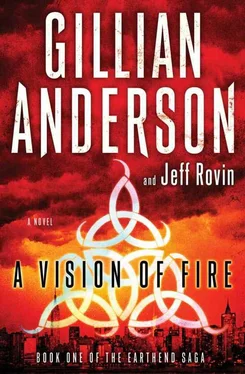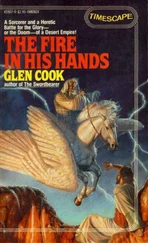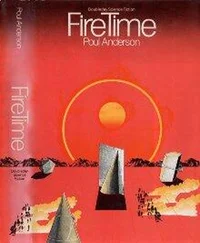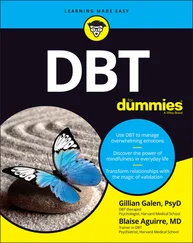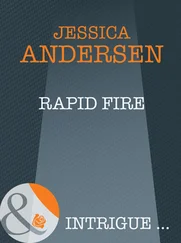The windows of the car were smoked to near-opacity and Caitlin wondered during their half-hour ride whether she was supposed to pretend she was not really there, or that the city was not there around her. Maryam, sharing the backseat with her, only gave Caitlin’s form a once-over before spending the rest of the ride on her phone in Farsi.
Caitlin glimpsed what she could through the windows and briefly mourned what she would not be able to do on this trip. Under any other circumstance she would have treasured the opportunity to see Tehran, a city she’d long hoped to explore. As it was, the driver used only expressways and the city didn’t seem that different from any other. There were wider avenues than in New York, shorter buildings but with more massive proportions, something broader about the windows, fewer glass fronts. But she didn’t have the time to move closer and really look.
The expressway passed near a boulevard that was crammed sidewalk to sidewalk with people. The color green was prominent in banners and she could hear the chanting roar from the gathering.
“A protest?” she asked, though Maryam was still on the phone.
“Yes,” Maryam said. “Economic. The women bus drivers have not been paid in a month.”
But to Caitlin’s ears, the protest had sounded much more aggressive than that. She wondered whether here, too, people were feeling the tensions of a world on edge.
They merged onto a slightly smaller highway and greenery increased between the buildings. A handful of men and women stood together in a small park, moving slowly through a Tai Chi sequence. Caitlin was mildly shocked to see this Chinese practice in Iran, and the sliding and angular arm motions instantly reminded her of Maanik and Gaelle’s movements.
A possible Mongolian connection right there , she thought as the sedan pulled in at the hospital. Connecting Mongolian to Chinese would certainly be a smaller step than tying Mongolian to Viking.
At the hospital, Maryam sat with her in reception while Caitlin quickly Skyped Jacob. Dressed in his pajamas and eating a Popsicle, the boy barely signed to her with one hand.
Finally she said, “Jacob, I want you to understand something. It’s very important. The young man I’m visiting—he might die. That’s why I had to come.”
Jacob didn’t say much, but he seemed to snap back to his usual, empathetic self and he blew her two kisses before ending the chat.
When the tablet closed, Maryam escorted Caitlin to Atash’s floor. Their entrance to Atash’s room was barred by a doctor who was not impressed with two female visitors—until Maryam held up a card that looked like an ID. The doctor did not miraculously develop a sense of courtesy, but he did walk away.
“I will also interpret for you,” Maryam said as they entered the hospital room.
Caitlin had not expected the sight that greeted them. She knew the young man had suffered third-degree burns over three-quarters of his body and would be fully swathed in bandages. She knew he was being kept alive by an array of vascular tubes and catheters. None of that surprised her. But Caitlin had not anticipated his trying to turn toward her, from the shoulders, when she entered the room.
“Does he know you?” Maryam asked.
“No… ,” Caitlin replied, a trace of hesitation in her voice, though she did not know why.
Caitlin did not approach the bed from the side but circled it, seeing if his movements would follow her. They did. Her heart ached for the boy and for his circumstances. She recognized the flowerless, impersonal feel of an unvisited room, an unloved person, an abandonment far worse than the burns that had immobilized him.
He was not only awake, he was murmuring. Maryam leaned over his head to listen.
After a moment she said, “This is not Farsi.”
“Do you recognize it?”
The young woman shook her head once, sharply.
A wave of fierce energy rushed through Caitlin—she knew what was coming next, why she had hesitated when asked if the boy knew her. She had been here before. Not in this room, not with him, but with Maanik and Gaelle.
Atash’s hands moved as much as the bolsters allowed him. His left arm trembled to the shoulder as the hand fought to point away from his body. His right hand moved up diagonally, just inches but enough for Caitlin to recognize one of Maanik’s superlatives.
She pulled out her cell phone and held it up to record the gestures.
“No!” Maryam snapped.
“Please, this may help him! Someone else has to see—”
“No, absolutely.” She was not demonstrative about her insistence, simply firm in a way that told Caitlin there was no point in arguing. She suspected this was a rule meant to benefit not the patient but the paranoia of a totalitarian regime.
She stowed her cell phone, leaned over Atash, and listened. There were the guttural consonants, the whirring of Asiatic “r”s.
“Ask him to speak in Farsi, please,” she said.
Maryam leaned forward but before she finished the question Atash changed. His hands fixed rigidly and his utterances shifted in tone. The higher language disappeared, replaced by prolonged and very quiet grunts.
Caitlin felt her hands tighten helplessly. She knew the young man was in agony. She could only think of one way to communicate that might work, but both his hands were bandaged. She reached out with her left hand—the madame in Haiti had directed her to use her left hand with the snake; Jacob had sensed the ocean with his left—and lightly touched one of the only bare areas of Atash’s skin, his throat.
Something exploded inside Caitlin’s head. It was fast and heavy and pressed the sides of her skull outward, like the throb of a headache frozen painfully in place. Then it pushed through and was outside her body—pressure rolling around her, forcing her eyelids shut. She could not open her mouth to scream but she felt the cry in her throat.
She forced herself to open her eyes. The white of the walls, of the bandages, had been transformed into dark rock and ice—jagged towers of it coming into focus far behind the dark, rectangular columns that were in front of her. And a man, a pale young man, was communicating with hands and arms and strange but familiar words—leaning forward with urgency, begging, almost bowing with his pleading.
Caitlin couldn’t understand. Her eardrums were throbbing from pressure that wrapped around her head, pressure that was closing her throat, blocking sound and breath.
The recent past, the present, her world and life were all out of focus. Wherever she was, whoever she was, whatever she was seeing, was rising before her with razor-edged clarity.
And suddenly the words became familiar. The columned structure, vast and high, was known to her. The buildings beyond, dark among patches of lavender and green foliage, were places she had seen. And farther away, those peaks that looked less like mountains than like explosions of ice—
She was looking through eyes that were not her own at a world that was not her own. The pale young man pleaded with her from the floor.
“Save my brother, save me! Please! Show us how!”
“ I am no longer Guardian to him or to you ,” she said in the voice of an old man, unable to control the words coming from her own throat. “ You put your faith in things that have no true power . You have crafted your own fate. ”
“We will repent, we will speak the cazh !”
“ No ,” she replied sadly. “ You will die .”
The speaker turned away and the young man propelled himself up from the floor and ran away into the street. Her body hurried to join the other robed figures near the columns a dozen or so yards away, their arms raised toward the dark skies. Her sleeves heavy with oil, she lifted her hands to complete the prayer of cazh and let out a howling scream. Her hands were suddenly on fire, her fingers whirling to pieces in the air even as she signed a word, the only word she could manage, a superlative for “transform.”
Читать дальше
